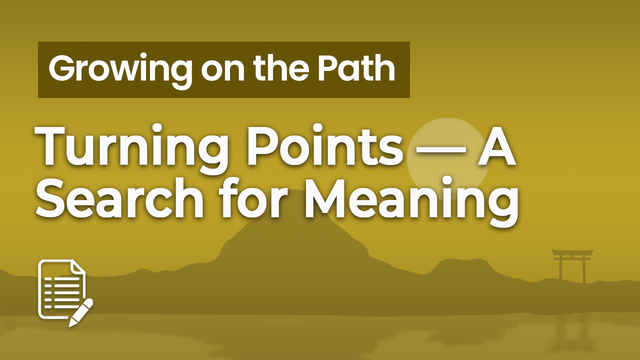
Ramakrishna Ananda
Second Technique — Introspection
Having trouble letting go of old habits? Try yoga introspection
You can learn a great deal about life by studying it. There is a perfect subject for study — you. The more you understand yourself, the more you will be able to understand other people. The more you deal with the variables within yourself, the more you can become a true friend to other people. Self-mastery is based on three principles — self-discipline, introspection, and devotion — and it is very much developed in this second technique called introspection, or self-study.
By practice of introspection, we mean taking five or ten minutes each day to study yourself. You will find it very interesting. You will often be amazed at what is going on inside you.
To practice introspection, use self-discipline! That is, choose ten minutes in the evening before bed, or perhaps in the morning before you go to work. Choose an introspection time and keep it. You will shortly find that you love the experience; and the added efficiency and clarity in your life will convince you how important your introspection time is. Some of the greatest delights of your day will occur during this introspection practice.
First Week
Sit comfortably. Relax. For the purpose of describing this technique, let us say you are practicing introspection in the evening. Evening is often the best time but you may have a different preferred time for very good reasons. Take two or three deep breaths which will help to harmonize your life force and enable a greater sense of harmony between your body, life force, emotions, and thoughts.
Now simply recall, as clearly as you can, the day which you have just completed. Recall, think back, to when you awoke. Consider how you got out of bed. Think of your sequence in washing your body and brushing your teeth, in detail. If you were listening to the radio, what songs were played? In what sequence did they occur?
Recall dressing. For instance, what socks did you choose today? Which foot did you dress first? What did the socks feel like — both as you were putting them on and as you continued dressing? What were you thinking while you dressed? What was happening around you as you dressed? Were airplanes overhead? Could you hear the birds? Could you smell the pancakes? (Or were the pancakes your responsibility this morning?) Remember the sizzle of the butter? The sound of clinking glasses?
You get the idea. Recall clearly as if you were producing a movie. Recall vividly, from awakening this morning, all the events and experiences of your day. Make your day’s “film clip” as accurate as you can.
When you have spent ten minutes at this practice, put the film clip aside, even if you were only able to recall a few minutes of your day, or even if you recalled so slowly and thoroughly that your reflection period barely covered five of those waking minutes this morning.
Do the above first phase of the introspection technique for a week.
Second Week
Now, as you sit in self-study each evening, strive to move the film clip of your day smoothly and fluently. Strive to see your entire day from early morning to the present time within five to seven minutes! You do have the ability. It is possible. You can recall vividly, and in detail, as you view an eighteen to twenty-four hour period. Mental time is different from physical time. You’ll be amazed that you can, through practice, develop the capacity to see a continuous sequence of your day rolling easily from one event to another. You can observe the play of your thoughts as well as the events of your activities in the outer world.
Let the continuous sequence of your day pleasantly, and sometimes unpleasantly, roll past your attention. Many insights and much contentment start to occur as you develop this ability to observe yourself in a calm, objective way. Practice this condensed, daily movie each day for a week, or take longer if you wish.
Some people have difficulty visualizing but it is still possible to practice introspection by recalling the feelings, thoughts, the sounds of your day. Recall your words and conversations. Remember the nonsense sounds, the machinery, all the sounds of bustle and activity in their sequence. Recalling your day in a non-visual way will give you the same benefits as if you were keenly visualizing the picture movie.
Third Week
Relax and do your deep breathing. Now you are getting into the nitty-gritty. Many of the benefits of introspection will become apparent to you this week. Let your day’s movie roll. Be attentive. Now, notice. When you see something you particularly approve of in your film clip, stop the film, suspend it temporarily. Holding the excellent event before your mind, tell yourself something like this: “Yes, I like the way I behaved there. That is the way I wish to speak in the future. That is the way I would like to handle that situation each time it comes up. I like what was done there.”
Then, having noted this indication of goodness, and your growth, let the film start again. Stop it each time you see something you have done which makes you happy. Also notice the times that you withheld speaking a word that would hurt another, or withheld a resentful action. Stop the film at each point and notice each part of the movie where you are particularly happy with your conduct.
Proceed in this manner, stopping the film and clearly noticing your good points. Let this practice become automatic. At first it’s a little tricky stopping and starting the film clip, but within three or four days you will likely have the hang of it.
Fourth Week
Now you can really make huge gains in creating the kind of life that you want. Now you can much more easily become the person you yearn to be.
At this time, sit comfortably, take your deep breaths, and let the film roll. Enjoy it in vivid detail as it moves effortlessly through your day.
Remember to stop the film wherever you particularly like your conduct, where you’ve said words that proved constructive to other people, when you handled a difficult situation in a manner that was particularly beneficial to all concerned, noting where you stood up for your rights or your values, or where you successfully closed the deal, or happened to be at the right place at the right time. Note each of these as you go through your day.
But, also, stop the film whenever you see yourself performing in a way that you don’t like. Wherever you’re unhappy with what you said or did, wherever you don’t like or approve of your underlying feelings or motives, stop the film. Pause and reflect: “I don’t like the way I behaved there. I’m not happy with the way I spoke. I certainly wouldn’t like to do that again.”
With the film pausing but ready to roll on when you say the word, take time to consider for a moment: “What would I rather do? What would have been better for me to say? How could I have handled that better? More importantly, how would I like to handle that next time? What would be a better way to deal with this situation if it comes up again?”
Raise these questions and determine how you’ll behave next time, what you will choose to do if given another opportunity. Then you can edit your film. Consciously consider what you will do in the future. What is the ideal conduct? What is the best way to handle this situation if given another chance? Mentally conceive of this, visualize it. Have the feelings now that you would like to have at that time. You can generate a new attitude and a new way of being at the ready for the next chance.
Edit Your Movie
When you have clearly visualized and felt the new ideal behavior that you would prefer to express at the next opportunity, discard the old piece of that movie, the part you don’t like. Throw it on your cutting room floor, put it in the trash. If you’ve learned the lesson of that unpleasant film clip, benefit by it and throw it away. You don’t need it anymore. You’ve been willing to learn from it. You’ve studied it. You faced the pangs of conscience, or fear or doubt. You have learned. You’ve done your part.
You may also, at this point, clearly see what you can do to make amends, or to whom you should apologize on the morrow.
Now, go on with your movie. Let the film roll again. As the film rolls, stop it at the good points. Notice them. Clarify them. But also, love yourself enough to stop at the unpleasant points too. You can change them now, here in your easy chair. You can create a more ideal you. You can avoid so much suffering and continual rejection if you will study your life.
When you become an expert at this practice you can rapidly accelerate your opportunities for success. Instead of dragging through life, learning only from trial and error, you can easily redirect your consciousness in a short time by becoming more conscious and aware. You can enrich every other area of your life. Furthermore, you’ll become a more thoughtful person. You won’t forget the good parts of your day, nor the good done you by others so constantly.
The question may occur, “What if I, in the safety of my easy chair, create a new section in my film clip — a new way that I’d ideally wish to behave — but then I go out into that situation again in a few days only to find I fall back on my same old ways, ways I disapprove of, ways I thought I had conquered?”
Don’t be discouraged. Keep in mind that as you do this practice you are truly changing your tendencies. Remember how powerful tendencies are? When you find that one period in introspection had not changed an old, deeply ingrained habit, simply determine to keep up the practice one day at a time, until this new state of being becomes your tendency, becomes your habit.
Benefits
As you view your film clip and recall your most recent failure, you will also gain more insights about the true nature of the problem and more specific information about how to form the new ideal more clearly and effectively. You may also be amazed how quickly new tendencies that you have consciously and lovingly chosen can root out and forever put aside old tendencies, however entrenched. Have good will for yourself and hang in there. You are studying one of the most important subjects in the universe — your life.
We now know two of the three great techniques: self-discipline and introspection.
Reflection
I witness my life and wonder:
Is my Self the viewer or creator?




